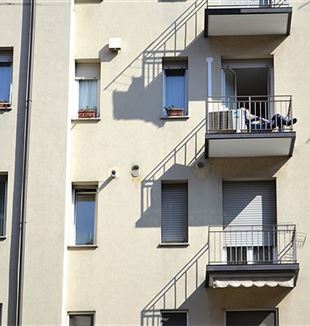
I do not give up my heart's thirst for happiness
Isolation and the adventure of distance learning. The desire to accompany each other and the inability to help friends. And the inexplicable, but real evidence of a "constant backdrop of joy and certainty".Like many people, I am completely alone. I began this period with a number of mental images of what it would be like, including how long it would last and the loneliness I would have to fight. Reality took on the task of deconstructing these images, and I had to admit this little by little.
To occupy my time, I began the adventure of distance learning, even though, a few days before, I had sworn that it would be impossible and catastrophic. Even though I had to come up with everything through trial and error, it is a very interesting experience, which forces me to ask myself again what is really useful, what it means to help my students and what I really want to pass on to them. I have rediscovered that work is not a project to be implemented, but an attempt to respond, clumsy and full of demand for accomplishment, to reality as it presents itself. And that to teach is not to dispense knowledge from above, but to set out together to discover what makes us live now.
My relationship with some students has been shaken and has changed. One student, in particular, who is very self-effacing in class and who had never spoken to me, wrote me messages on WhatsApp to tell me how touched she had been by our work on Les Misérables, discovering that a being can be profoundly changed by the way another looks at them; and that if reading was this human adventure, it was worth it.
In regards to solitude, in his letter to the Fraternity, Carrón wrote to us: "How can we accompany each other in all this?” More or less consciously, I responded with my image: to call friends so as not to lock myself up in solitude and to accompany those who are alone, to witness to the beautiful things that are happening... But little by little I realized an inexplicable but real evidence: I do not feel alone for a second, and a constant backdrop of joy and certainty lives within me. Favourable circumstances or my temperament are not enough to explain it.
Giussani's phrase in the Religious Sense came to mind: "That same question, in the very same instant that it defines my solitude, also established the root of my companionship, because this question means that I myself am constituted by something else mysterious (...). Such companionship is, then, more original to us than our solitude. (...) Before solitude there is companionship, which embraces my solitude.” This companionship is above all deep within me, structural. It is there when I work, when I wash the dishes, when I pray. It takes care and loyalty to recognize it.
I have taken advantage of this time to read the book of the month on Van Thuan, which is surprisingly relevant to the current events we are living through. At one point, Van Thuan is a prisoner, very ill, chained and crammed together with others in the hold of a ship, dying of hunger and cold, and not knowing where he is going. He realizes that he is in danger of dying whilst being deported, far from his land and his loved ones. Immediately, in the next sentence, he adds: "Make sure that I die happy." The problem is not the circumstance, but that I do not give up my heart's thirst for happiness.
A few days ago, for the first time, I felt caged within my own home: exchanges with several friends brought out needs, necessities, which I would have liked to be able to respond to simply, by visiting, doing a service, etc. I would have been very happy to be able to do so. What seemed most natural and obvious to me was impossible, it seemed absurd and I felt like an amputee. I need proof, not in the future, but now, that this sacrifice has a meaning, that it is not a loss compared to what I could do. The question is all the more burning because it is not only a problem of isolation, but of my whole life: I would like to do everything for those I love, but I cannot satisfy their thirst and meet their needs.
Read also - There is no recipe
So I went back to School of Community, and Carrón's letter to the Fraternity: "Our recognition of Christ and 'yes' to Him, including in the isolation each of us might be forced to maintain, is already our contribution to the salvation of every man and woman today [therefore of my friends, of those I love], before any legitimate attempts to accompany one another…Nothing is more urgent than that self-awareness.”
I discovered that the experience of this companionship in every moment that has taken me by surprise in my life was the source of certainty and hope, also when thinking of those whom I love and would like to love more, whom I cannot reach.
Signed letter#Coronavirus